Taking advantage of the opportunities offered by the evolution of the setting and the new economic, social and environmental challenges, in an increasingly integrated perspective, Acea’s strategic planning balances both the industrial dimension and the sustainability aspects in its business goals.
Consolidating the evidence of the successful results already achieved in the previous year, in April 2019 Acea updated the Business Plan for 2019-2022 with even more challenging objectives than the previous ones. In the development process, the Company confirmed the following strategic pillars:
- Industrial growth focused on infrastructural development and a customer-oriented approach;
- Territory and sustainability based on decarbonization through greater electrification of consumption, the recovery of of material in the waste cycle;
- Technology, innovation and quality, with innovative projects involving automation and resilience of infrastructure to facilitate the transition to advanced models of smart grids and smart cities;
- Operating efficiency, by means of the careful regulation of costs and investments and improvement of performance.
The total investments envisaged in the Plan amount to €4 billion.
Working towards an alignment between the business and sustainability strategies, Acea updated its Sustainability Plan for 2019-2022, which was approved by the Board of Directors in December. Again, the Group confirmed the articulation of the Sustainability Plan at a governance level, oriented towards the progressive integration of sustainability aspects into the company’s management and into five macro operational goals, which remained unchanged, broken down into targets for 2022 and related KPIs.
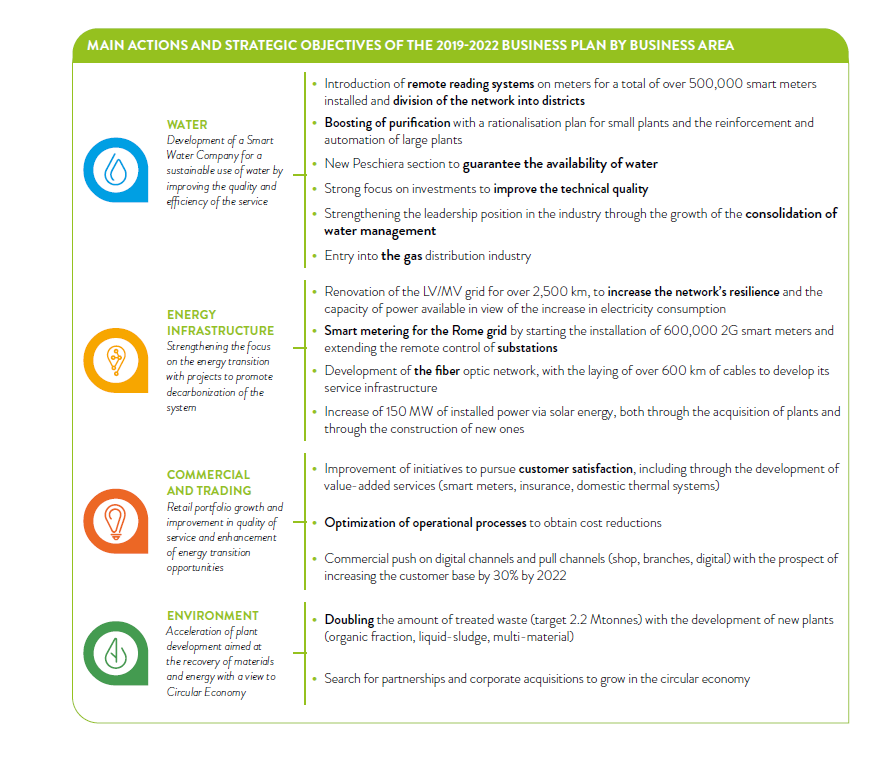
The updating process was carried out with the full involvement of the organizational structures (Parent Company and Operating Companies Functions). Two new governance objectives were introduced, bringing to 8 the cross-cutting goals, focusing respectively on the implementation of a welfare plan for employees, based on an advanced model of industrial relations, capable of identifying emerging social needs and sustainable management of the supply chain, with a focus on circular procurement. At the operational level, new targets were introduced and many of the previous ones were updated by the Functions of the Holding and the Companies, taking into account the sustainability aspects related to the industrial guidelines of the business areas, the material issues defined by listening to stakeholders and the relevant Sustainable Development Objectives of Agenda 2030. Overall, the 2022 targets increased from 137 to 183.
In addition to more challenging environmental objectives, linked in particular to the fight against climate change (mitigation and adaptation), the efficient use of resources and a logic of circular economy, new targets have been set for the development of a structured approach to stakeholder involvement, employee welfare and the widespread dissemination of a culture of safety within the Group and along the supply chain, as well as technological innovation applied to all infrastructure to increase intelligence and resilience, also by promoting excellence and skills and developing research projects in partnership.
Investments envisaged in the 2019-2022 Business Plan related to sustainability targets increased by €400 million for a total of €1.7 billion. In 2019 both the progress of the targets and the amount of investments committed were monitored, which, as at 31.12.2019 amounted to approximately €328.5 million. The amount of the year, added to the investments committed in 2018 (€175 million) brings the figure for the two-year period to €503.5 million.
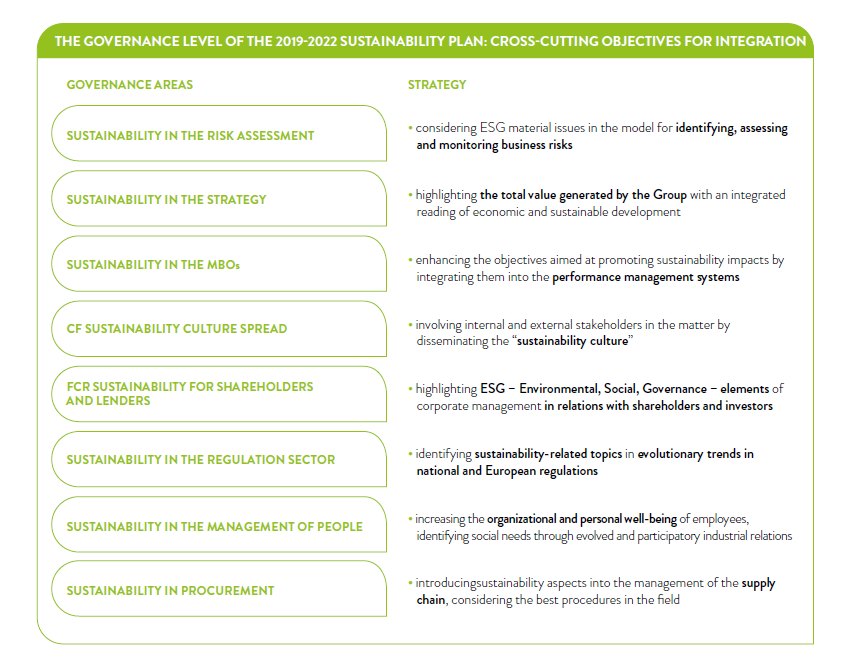
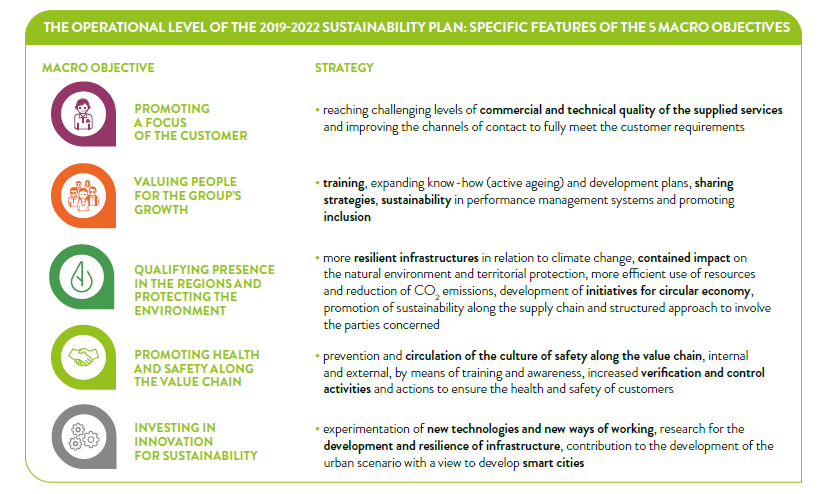
CHART NO. 8 – THE 2019-2022 SUSTAINABILITY PLAN IN NUMBERS
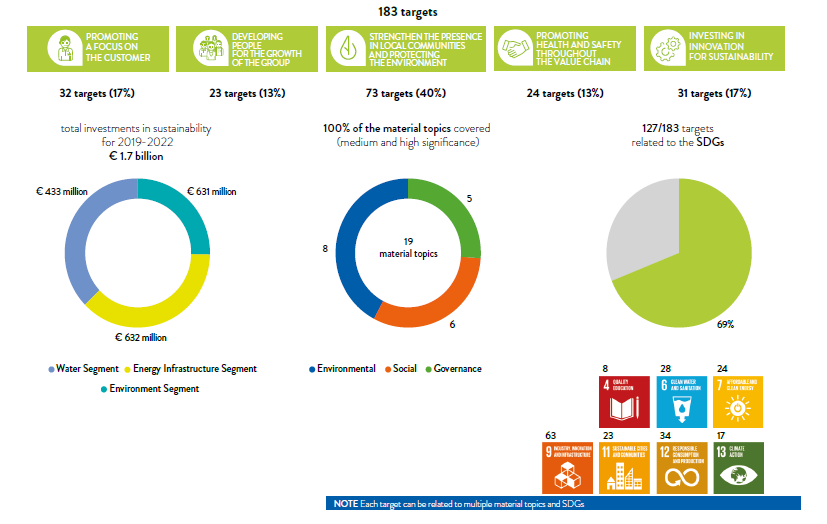
ACEA SUSTAINABILITY DAY
Acea’s first Sustainability Day was held in October 2019 and was an opportunity for the Company and representatives of institutions, research, businesses and experts in the field to discuss the scenarios and challenges posed by an economic and social system progressively marked by sustainable development.
The event, entitled Enterprise, sustainability and the future, focused the dialog between the qualified participants on the evolutionary dynamics that the path towards a sustainable economy places on current business, production and development models, in a perspective that is even evident in the guidelines expressed by the new EU Commission. The Chairman and the Managing Director of Acea SpA took part in the two round-table discussions with the Chairman of Labsus, the Spokesperson of Asvis, the Chairman of GSE and ENEA, the Deputy Secretary General of Unione del Mediterraneo, and, representing the national institutions, the Chairman of ARERA and a representative of Consob. A further moment of sharing was dedicated to the initiatives on circular economy and innovation that engage Acea through its Companies and in partnership with research bodies and companies, and in the final session the participants shared their reflections on the renewed prominence of industrial organizations as agents of innovation, towards a company management characterized by forward-looking perspectives within an appropriate regulatory and institutional framework sensitive to these issues.
The Policy for sustainability and the quality, environment, safety and energy system19 adopted in Acea reflects the principles, values and commitments undertaken by the company, placing them in the framework of the pursuit of sustainable development, and it is an integral part of the Management Systems compliant with ISO 9001, ISO 14001, ISO 45001 and ISO 50001 standards (see also the section titled Management systems). The Policy sees the following values as fundamental elements for sustainability, helping to integrate it more and more in the planning and management of activities:
- promotion of a culture of quality;
- respect for the environment and preservation of ecosystems;
- the development of people and safety at workplace;
- the efficient management of resources;
- a risk assessment and responsible management of economic, social and environmental impacts;
- dialog with stakeholders;
- the promotion of sustainability in the value chain involving the supply chain.
The guidelines expressed in the Group’s two strategic industrial and sustainability planning documents, already related in operational management, lend themselves to an integrated interpretation, which enhances the peculiarities and complementarity between the two Plans – one focused on aspects related to the economic solidity of industrial growth and the other on the expected results for stakeholders and from the social and environmental point of view – in the framework of Acea material issues and the relevant UN sustainable development goals (SDGs). An emblematic aspect, consistent with the integrated perspective taken over and responding to one of the most significant challenges, is that of climate change. This issue is of particular importance and represents one of the elements demanding the greatest attention from a social, environmental and economic point of view, as evidenced by the positions expressed by the European Union or by qualified international bodies, like the TCFD (Task Force on Climate-related Financial Disclosures) set up within the Financial Stability Board. The initiatives taken by Acea to tackle climate change were highly appreciated as evident in the recognition noted in the latest CDP assessment (see the dedicated box).
.
ACEA INCLUDED IN THE LEADERSHIP CATEGORY OF THE CARBON DISCLOSURE PROJECT – CDP
CDP is an organization that offers investors a system to
measure climate change policies and performance. The initiative, which for more than ten years has been supported by a pool of international investors with assets under management equaling $96 trillion dollars, analyses more than 8,000 companies in the world on performance linked to measures to combat climate change, endorsing the best in class in the strategic and operational management of risks and impacts inherent in the “climate” issue.
In 2019 CDP gave Acea a
score of A-, improving on the score received in the previous year (B) and qualifying for the Leadership category. The rating (D-/A scale) is based on the assessment of various areas, such as the presence of targets and initiatives undertaken for the reduction of emissions, the analysis, and management of risks, the assessment of financial impacts due to climate change, reporting, etc. The positioning obtained therefore recognizes Acea’s constant and growing commitment to combating climate change through an increasingly sustainable business model that is attentive to the issues of the energy transition.

More information can be found on the institutional website: https://www.cdp.net.
CHART NO. 9 – KEY ELEMENTS OF THE STRATEGY
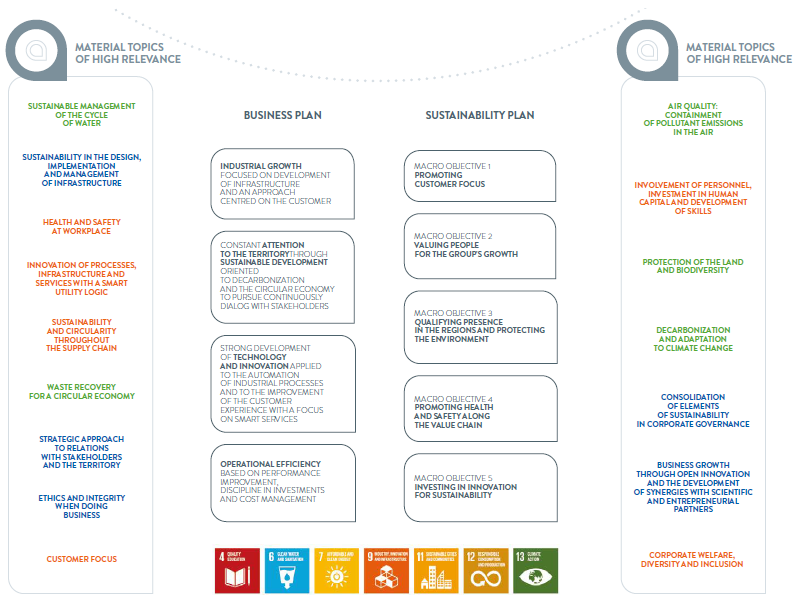
During the year, the Sustainability Unit, organizationally within the Parent Company’s Risk & Compliance Department, was regularly called up by the Board Committees responsible for overseeing these issues (see the section titled Corporate Governance and Management Systems) and the Sustainability Advisory Board was operational, a management body supporting the Acea Chairman and Managing Director (see the dedicated box) and a venue for sharing and analyzing the main developments and internal matters.
THE ACTIVITIES OF THE SUSTAINABILITY ADVISORY BOARD
The activities of the Sustainability. Since 2018, the Acea Sustainability Advisory Board, a panel responsible for providing support to the Acea Chairman and CEO, began its activities in order to supervise the implementation of the Sustainability Plan – with regard to both governance level guidelines and operational level objectives – and its periodic review. The Board operates on the basis of its own Rules; its composition is approved by the Board of Directors and consists of the main Functions and Departments of the Holding Company, which also have responsibility for the governance of sustainability planning. To date, the Functions/Departments involved are: Administration, Finance and Control; Corporate Affairs and Services; External Relations and Communications; Procurement and Logistics; Human Resources Management; Innovation, Technology & Solution; Internal Audit; Investor Relations; Regulatory; Risk & Compliance; Human Capital Development; Secretary of the Board of Directors. The Board met 3 times during 2019. Aside from discussing the process for updating and defining the new Sustainability Plan, the developments and evidence on important initiatives carried out by Acea were studied and shared, such as the Group’s stakeholder engagement project, or the definition within the framework of the working group activated in the CSR manager network of a guideline to integrate sustainability and ERM systems, and finally, the presentation of the first solicited ESG Standard Ethics rating requested and obtained by Acea.
19 The Policy is available from the institutional website www.gruppo.acea.it.





